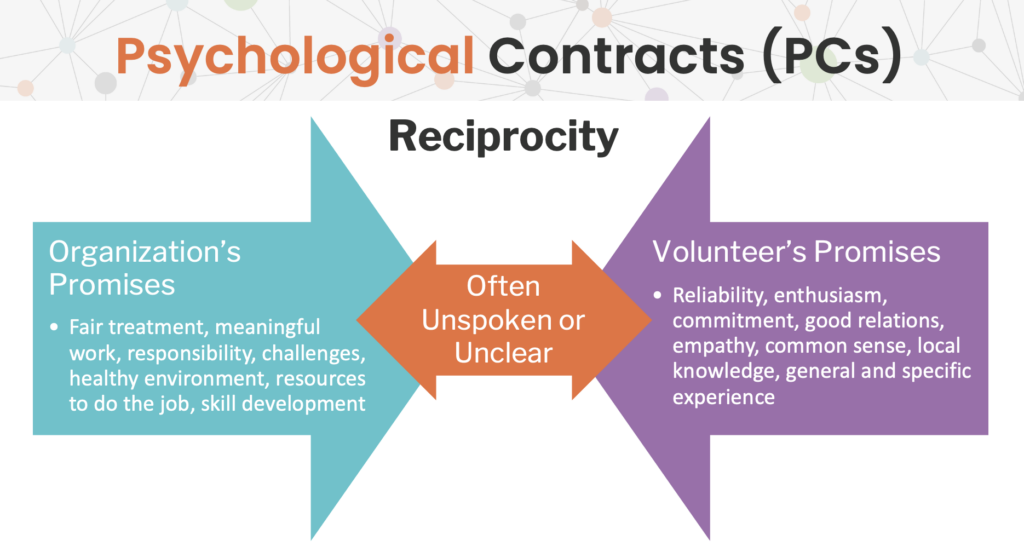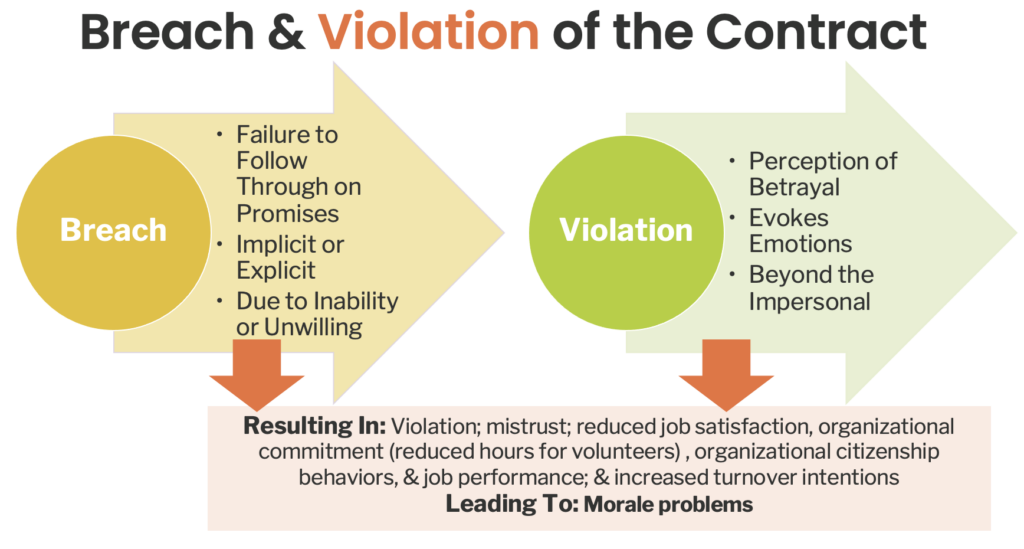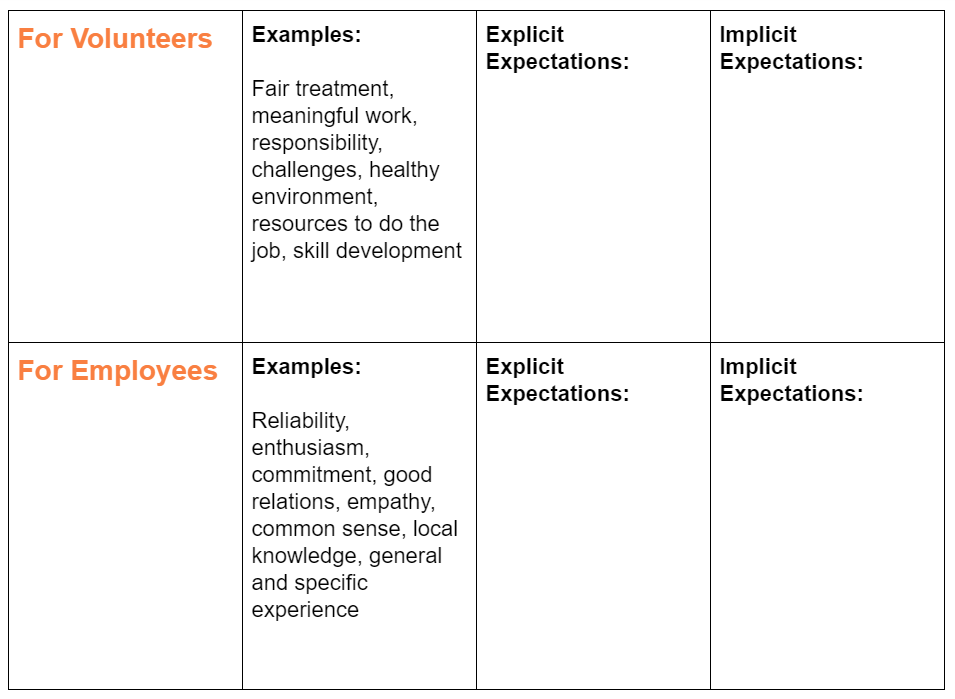 How to Uncover “Hidden” Expectations for Authentic Volunteer Appreciation
How to Uncover “Hidden” Expectations for Authentic Volunteer Appreciation
Genuine volunteer appreciation goes beyond plaques, pins, certificates, and giveaways. It involves deep listening and honoring the true needs of volunteers. But many volunteer expectations are never verbally expressed.
How do we understand them if they aren’t communicated? Psychological contract theory can help.
Psychological Contracts: The Foundation for Better Volunteer Appreciation
Much of our expectations in the work (and volunteer) world are based on promises we think others have made to us.
These are known as psychological contracts (PC), and they represent the mutual beliefs, perceptions, and informal obligations between an employer and an employee (or volunteer).
They set the dynamics for the relationship and can include both the implicit “unwritten” and explicit “clearly expressed” promises. They rest on the notion of reciprocity.
For example…
- An explicit promise might be that an organization will provide five hours of expert training to volunteers.
- An implicit promise by a volunteer might be that they will be loyal to the organization and not speak poorly about them in public.
Psychological Contract Breaches & Violations
Unfortunately, psychological contracts are created in the mind and never expressed. This can cause friction between volunteers and paid staff as expected “promises” go unfulfilled. This is known as a breach and has consequences.
When unchecked or rectified, breaches can mean perceived promises aren’t kept, which leads to negative emotions, which in turn leads to a perceived violation or slight, which can then result in decreased job satisfaction, commitment, and ultimate performance.
A breach can be experienced by both volunteers and paid staff, creating a vicious cycle of discontent.
That’s why it’s imperative to understand and surface what expectations both volunteers and employees bring to the table.
If you’ve ever worked with an employee who has supervised volunteers in the past and refuses to do so, or have met a volunteer who is reluctant to work with a specific employee, it likely that a psychological contract breach has occurred. Often, these create a vicious cycle of lack of engagement that needs an intervention from the outside to be broken.
The dynamic might look something like this – a volunteer is placed in a department, they are not trained well and don’t fully understand the expectations, so they don’t fulfill them.
Their supervisor is disappointed with their performance, but does not bring it up or address it directly it up. Instead, they withdraw support and the assignment of more interesting tasks from the volunteer.
Because of this, volunteers, like their supervisor, experiences a psychological contract breach and decreases their commitment to the organization and their role. They may decrease their hours, not complete work fully, or not show up.
In turn, the supervisor again perceives a breach, and their opinion about volunteers is no solidified – “they can’t be trusted and are more work than they’re worth.”
In other words, employees may be less willing to work with volunteers who they perceive to have breached their psychological contract. Therefore, the volunteer will experience lower levels of organizational support as it is withdrawn by the staff members, leading in turn to decreased volunteer participation.
We see this play out time and again in organizations, making it challenging for volunteer manager to effectively deploy volunteers at all levels. If this goes on, overall volunteer participation will decrease along with morale.
Ultimately, it is the organization that suffers. with fewer volunteers, staff are stretched thin. Employee effectiveness decreases and staff turnover increases.
And all this could have been prevented if the expectations of both sides were proactively surfaced, communicated, and addressed.
Read on to learn how.
Mapping Expectations for Better Volunteer Appreciation
Mapping expectations is a terrific way to begin to understand the hidden dynamics at play between employees and volunteers.
This framework also helps leaders of volunteers better understand how to recognize and reward volunteers by meeting their needs directly, all the while keeping the needs of their co-workers in mind.
How to Map the Psychological Contract
Use the template below to brainstorm the explicit and implicit promises that you believe make up the psychological contracts of your volunteers and co-workers. Refer to the examples to get you started.
We have conducted this exercise with employee-volunteer teams who were at odds due to psychological contract breaches. They were angry and nearly unwilling to work with the other side.
After this process, things changed.
Through this activity, they quickly come to understand that the promises that they believed the other side had made are often remarkably similar.
Each side hopes for clear information, candid conversations, and being given the benefit of the doubt among other acts that denote mutual respect.
In the end, they were committed to making those expectations a reality to become a better team and fulfill the mission both sides were so passionate about.
In the end, authentic volunteer appreciation and recognition is less about the “things” that are given to volunteers and more about the environment and team within which they work.
When it is good, they come back.
Therefore, to truly recognize volunteers for their invaluable contributions of time and talent should go far beyond offering tokens of appreciation.
If you take the time to understand their true needs, motivations, and expectations, you can proactively meet them where they are and work to create an environment that works for everyone.
For more tips on how to supervise volunteer effectively, check out Chapter 5: Volunteer Supervision of our Free resource – The Essential Guide to Managing Volunteers at Your Nonprofit HERE >>
Learn a Complete Volunteer Engagement System that Keeps Volunteers Coming Back
One of the best things you can do to acknowledge the valuable contributions of volunteers is to give them an exceptional place to do their work. It all starts with solid volunteer program design and impeccable implementation.
Our volunteer management certificate course helps you develop systems and frameworks that add more predictability to your practice, including how you recognize and reward volunteers. Knowing what comes next, and what levers to pull to influence a specific result are super helpful to working in a calmer, more methodical way. Your volunteers will benefit, too!
If you’re not feeling completely organized around your volunteer program or strategy, and you’re just not sure what steps to take next, then our signature online course is the perfect fit for you.
Join the Wait List for Our Next Session – Volunteer Management Fundamentals Certificate
Join us for the most comprehensive program in the field for leading a high-impact volunteer engagement strategy that works.
This online course is the only implementation program of its kind that not only shows you exactly how to attract qualified volunteers – but how to make your org the place they want to return to repeatedly.
Over 5 weeks of instruction, combined with weekly live Q&A coaching calls, you will learn everything you need to implement or make improvements to your volunteer programming. As a student, you’ll also be invited to our live Q&A coaching calls and have lifetime access to the course.
The Volunteer Management Fundamentals Certificate is the complete package to help you get there!










